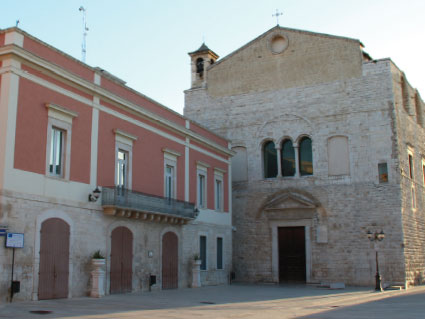




Corato is an Italian town of 48,424 inhabitants located in the large area of the metropolitan city of Bari, in Apulia. The municipal territory, with an area of 167.73 km², lies on the eastern slopes of the Murgia, in the heart of Imperial Apulia, the land which was preferred by Emperor Frederick II, at an altitude of 232 meters above sea level and is located on the perimeter of the National Park of Alta Murgia. An area soaked with history since its prehistoric origins, as proven by numerous archaeological evidence. The limestone chianche [stones] of the old town whisper some medieval tales, the story goes that the birth of the fortified village dates back to the Norman period (XI sec.).
The town has its own urban identity, almost a single unit in concentric rings, with its churches (Santa Maria Maggiore, San Vito, Maria SS. Incoronata, Santa Maria Greca, San Domenico, San Benedetto, Madonna del Carmelo, San Francesco) and palaces (Gioia, De Mattis, Lamonica, Catalano, Gentile Griffi, Spallucci) which hold small treasures. The monuments, which are symbol of the religious and secular power, are all located along the roads, on the directrixes and bisectors; the visitor is always attracted to proceed toward the inside, and from the inside he is again pushed outwards.
Since 1874 the town enriched itself also of a splendid monument that has been recently restored, a place of civilization and culture: the Municipal Theatre. With about 500 seats and a strong vocation for the natural acoustics, it is a place of very high value, equipped with the best technical and architectural innovations.
In the town, a Museum of the Town and the Territory is also set up in the former prison, dated back to the early twentieth century. It keeps ancient archaeological finds dating back to 8000 years ago documented by the Neolithic settlement of Torrepaone, pre-Roman evidence, coming from the burial mounds of Saint Magno, as well as Roman evidence, such as the milestones of the Via Traiana.
Just move outside the walls, and you’ll find yourself in harmony with nature, at first with olive groves, vineyards and arable fields, then with the karst environment of the Alta Murgia (High Murgia). Indeed, the surrounding area is one of the places in Italy with the greatest extension of natural vegetation: including shrubs, cardoons, asphodels, mosses, lichens, aromatic plants and wild orchids. Here environment and sustainability are inextricably linked since the area has become a National Park and today it enjoys the Charter for Sustainable Tourism.
Corato, city of the Olive Tree and the Dolmen, is now the territory of excellence in the agro-food industry, with the cereal pole among the largest in Europe, with quality wines, pasta factories, the valuable olive oil and dairy products.
The numerous emigrants from Corato have created significant communities anywhere in the world. One of these is in Grenoble, France.
Tourist Office
+39 080 9592111
Tourist Office
+39 080 8728008
http://www.prolococorato.it
prolococorato@libero.it
Tourist Office
P.zza Sedile, 45
+39 080 8720861
Town Police
+39 080 8721014